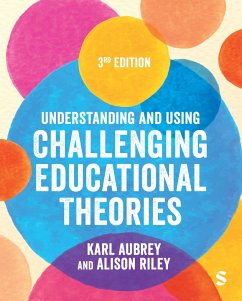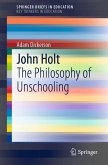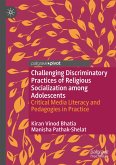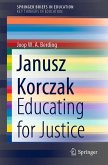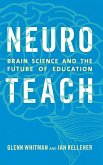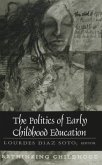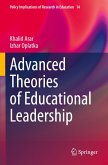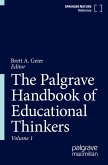- Gebundenes Buch
- Merkliste
- Auf die Merkliste
- Bewerten Bewerten
- Teilen
- Produkt teilen
- Produkterinnerung
- Produkterinnerung
- Weitere 8 Ausgaben:
- Gebundenes Buch
- Broschiertes Buch
- Broschiertes Buch
- eBook, ePUB
- eBook, ePUB
- eBook, ePUB
- eBook, PDF
- eBook, PDF
A comprehensive textbook on important educational theorists, building on Aubrey & Riley's main book (Understanding and Using Educational Theories 3e) and offering a practical, theoretical and critical overview of more challenging theorists, including many with a strong sociological focus.
Andere Kunden interessierten sich auch für
![John Holt John Holt]() Adam DickersonJohn Holt49,99 €
Adam DickersonJohn Holt49,99 €![Challenging Discriminatory Practices of Religious Socialization among Adolescents Challenging Discriminatory Practices of Religious Socialization among Adolescents]() Kiran Vinod BhatiaChallenging Discriminatory Practices of Religious Socialization among Adolescents38,99 €
Kiran Vinod BhatiaChallenging Discriminatory Practices of Religious Socialization among Adolescents38,99 €![Janusz Korczak Janusz Korczak]() Joop W. A. BerdingJanusz Korczak49,99 €
Joop W. A. BerdingJanusz Korczak49,99 €![Neuroteach Neuroteach]() Glenn WhitmanNeuroteach135,99 €
Glenn WhitmanNeuroteach135,99 €![The Politics of Early Childhood Education The Politics of Early Childhood Education]() The Politics of Early Childhood Education36,55 €
The Politics of Early Childhood Education36,55 €![Advanced Theories of Educational Leadership Advanced Theories of Educational Leadership]() Khalid ArarAdvanced Theories of Educational Leadership75,99 €
Khalid ArarAdvanced Theories of Educational Leadership75,99 €![The Palgrave Handbook of Educational Thinkers The Palgrave Handbook of Educational Thinkers]() The Palgrave Handbook of Educational Thinkers669,99 €
The Palgrave Handbook of Educational Thinkers669,99 €-
-
-
A comprehensive textbook on important educational theorists, building on Aubrey & Riley's main book (Understanding and Using Educational Theories 3e) and offering a practical, theoretical and critical overview of more challenging theorists, including many with a strong sociological focus.
Hinweis: Dieser Artikel kann nur an eine deutsche Lieferadresse ausgeliefert werden.
Hinweis: Dieser Artikel kann nur an eine deutsche Lieferadresse ausgeliefert werden.
Produktdetails
- Produktdetails
- Verlag: SAGE Publications Ltd
- 3. Auflage
- Seitenzahl: 432
- Erscheinungstermin: 20. September 2024
- Englisch
- Abmessung: 241mm x 196mm x 28mm
- Gewicht: 996g
- ISBN-13: 9781529672206
- ISBN-10: 1529672201
- Artikelnr.: 70343785
- Herstellerkennzeichnung
- Libri GmbH
- Europaallee 1
- 36244 Bad Hersfeld
- gpsr@libri.de
- Verlag: SAGE Publications Ltd
- 3. Auflage
- Seitenzahl: 432
- Erscheinungstermin: 20. September 2024
- Englisch
- Abmessung: 241mm x 196mm x 28mm
- Gewicht: 996g
- ISBN-13: 9781529672206
- ISBN-10: 1529672201
- Artikelnr.: 70343785
- Herstellerkennzeichnung
- Libri GmbH
- Europaallee 1
- 36244 Bad Hersfeld
- gpsr@libri.de
Karl Aubrey is a Visiting Tutor on the Professional Studies in Education programmes at Bishop Grosseteste University. Prior to this Karl was the Programme Leader for a range of initial teacher education and professional development programmes at a large city further education college. Between 2003 and 2005 he was seconded to the DfES Standards Unit as a learning and teaching practitioner in the East Midlands. Karl has contributed to the Oxford Dictionary of Education. His doctoral thesis explored the reforms in further education teacher education from 2000 to 2010, from the viewpoint of teacher educators. Karl's research interests include inclusion, education policy, pedagogy and work-based learning.
Introduction
Ch1 Abraham Maslow: The third force in psychology
Ch2 Carl Rogers: Learner-centred teaching and the fully functioning person
Ch3 A.S. Neill: Freedom to learn
Ch4 John Goodlad: The renewal of teaching and learning, schools and teacher
education
Ch5 Basil Bernstein: Language codes, social class, pedagogy and the
curriculum
Ch6 Ivan Illich: Deschooling society: challenging the concept of school
Ch7 Pierre Bourdieu: Theory of society
Ch8 Michel Foucault: Power, surveillance, discipline and control in
education
Ch9 Loris Malaguzzi: The Reggio Emilia experience
Ch10 Nel Noddings: Caring in education
Ch11 Lawrence Stenhouse: Linking the curriculum with theory, research and
practice
Ch12 Michael Apple: Ideology, knowledge, power, and the curriculum
Ch13 Henry Giroux: Critical pedagogy
Ch14 Howard Gardner: Multiple intelligences and education
Ch15 John Holt: Unschooling or home schooling
Ch16 bell hooks: Education as the practice of freedom
Ch17 Jack Mezirow: Transformative learning
Ch18 Linda Darling-Hammond: Equity in education: policy, teachers and
teaching
Ch19 Diane Ravitch: From Champion To Critic Of The American Education
System
Ch20 Gloria Ladson-Billings: Culturally Relevant Pedagogy
Ch1 Abraham Maslow: The third force in psychology
Ch2 Carl Rogers: Learner-centred teaching and the fully functioning person
Ch3 A.S. Neill: Freedom to learn
Ch4 John Goodlad: The renewal of teaching and learning, schools and teacher
education
Ch5 Basil Bernstein: Language codes, social class, pedagogy and the
curriculum
Ch6 Ivan Illich: Deschooling society: challenging the concept of school
Ch7 Pierre Bourdieu: Theory of society
Ch8 Michel Foucault: Power, surveillance, discipline and control in
education
Ch9 Loris Malaguzzi: The Reggio Emilia experience
Ch10 Nel Noddings: Caring in education
Ch11 Lawrence Stenhouse: Linking the curriculum with theory, research and
practice
Ch12 Michael Apple: Ideology, knowledge, power, and the curriculum
Ch13 Henry Giroux: Critical pedagogy
Ch14 Howard Gardner: Multiple intelligences and education
Ch15 John Holt: Unschooling or home schooling
Ch16 bell hooks: Education as the practice of freedom
Ch17 Jack Mezirow: Transformative learning
Ch18 Linda Darling-Hammond: Equity in education: policy, teachers and
teaching
Ch19 Diane Ravitch: From Champion To Critic Of The American Education
System
Ch20 Gloria Ladson-Billings: Culturally Relevant Pedagogy
Chapter 1: Abraham Maslow: The father of American humanism
Chapter 2: Carl Rogers: Learner-centred teaching and the fully functioning person
Chapter 3: A.S. Neill: Freedom to learn
Chapter 4: John Goodlad: The renewal of teaching and learning, schools and teacher education
Chapter 5: Basil Bernstein: Language codes, social class, pedagogy and the curriculum
Chapter 6: Ivan Illich: Deschooling society: challenging the concept of school
Chapter 7: Pierre Bourdieu: Theory of society
Chapter 8: Michel Foucault: Power, surveillance, discipline and control in education
Chapter 9: Loris Malaguzzi: The Reggio Emilia experience
Chapter 10: Nel Noddings: Caring in education
Chapter 11: Lawrence Stenhouse: Linking the curriculum with theory, research and practice
Chapter 12: Michael Apple: Ideology, knowledge, power, and the curriculum
Chapter 13: Henry Giroux: Critical pedagogy
Chapter 14: Howard Gardner: Multiple intelligences and education
Chapter 15: John Holt: Unschooling or home schooling
Chapter 16: bell hooks: Education as the practice of freedom
Chapter 17: Jack Mezirow: Transformative learning
Chapter 18: Linda Darling-Hammond: Equity in education - policy, teachers and teaching
Chapter 2: Carl Rogers: Learner-centred teaching and the fully functioning person
Chapter 3: A.S. Neill: Freedom to learn
Chapter 4: John Goodlad: The renewal of teaching and learning, schools and teacher education
Chapter 5: Basil Bernstein: Language codes, social class, pedagogy and the curriculum
Chapter 6: Ivan Illich: Deschooling society: challenging the concept of school
Chapter 7: Pierre Bourdieu: Theory of society
Chapter 8: Michel Foucault: Power, surveillance, discipline and control in education
Chapter 9: Loris Malaguzzi: The Reggio Emilia experience
Chapter 10: Nel Noddings: Caring in education
Chapter 11: Lawrence Stenhouse: Linking the curriculum with theory, research and practice
Chapter 12: Michael Apple: Ideology, knowledge, power, and the curriculum
Chapter 13: Henry Giroux: Critical pedagogy
Chapter 14: Howard Gardner: Multiple intelligences and education
Chapter 15: John Holt: Unschooling or home schooling
Chapter 16: bell hooks: Education as the practice of freedom
Chapter 17: Jack Mezirow: Transformative learning
Chapter 18: Linda Darling-Hammond: Equity in education - policy, teachers and teaching
Introduction
Ch1 Abraham Maslow: The third force in psychology
Ch2 Carl Rogers: Learner-centred teaching and the fully functioning person
Ch3 A.S. Neill: Freedom to learn
Ch4 John Goodlad: The renewal of teaching and learning, schools and teacher
education
Ch5 Basil Bernstein: Language codes, social class, pedagogy and the
curriculum
Ch6 Ivan Illich: Deschooling society: challenging the concept of school
Ch7 Pierre Bourdieu: Theory of society
Ch8 Michel Foucault: Power, surveillance, discipline and control in
education
Ch9 Loris Malaguzzi: The Reggio Emilia experience
Ch10 Nel Noddings: Caring in education
Ch11 Lawrence Stenhouse: Linking the curriculum with theory, research and
practice
Ch12 Michael Apple: Ideology, knowledge, power, and the curriculum
Ch13 Henry Giroux: Critical pedagogy
Ch14 Howard Gardner: Multiple intelligences and education
Ch15 John Holt: Unschooling or home schooling
Ch16 bell hooks: Education as the practice of freedom
Ch17 Jack Mezirow: Transformative learning
Ch18 Linda Darling-Hammond: Equity in education: policy, teachers and
teaching
Ch19 Diane Ravitch: From Champion To Critic Of The American Education
System
Ch20 Gloria Ladson-Billings: Culturally Relevant Pedagogy
Ch1 Abraham Maslow: The third force in psychology
Ch2 Carl Rogers: Learner-centred teaching and the fully functioning person
Ch3 A.S. Neill: Freedom to learn
Ch4 John Goodlad: The renewal of teaching and learning, schools and teacher
education
Ch5 Basil Bernstein: Language codes, social class, pedagogy and the
curriculum
Ch6 Ivan Illich: Deschooling society: challenging the concept of school
Ch7 Pierre Bourdieu: Theory of society
Ch8 Michel Foucault: Power, surveillance, discipline and control in
education
Ch9 Loris Malaguzzi: The Reggio Emilia experience
Ch10 Nel Noddings: Caring in education
Ch11 Lawrence Stenhouse: Linking the curriculum with theory, research and
practice
Ch12 Michael Apple: Ideology, knowledge, power, and the curriculum
Ch13 Henry Giroux: Critical pedagogy
Ch14 Howard Gardner: Multiple intelligences and education
Ch15 John Holt: Unschooling or home schooling
Ch16 bell hooks: Education as the practice of freedom
Ch17 Jack Mezirow: Transformative learning
Ch18 Linda Darling-Hammond: Equity in education: policy, teachers and
teaching
Ch19 Diane Ravitch: From Champion To Critic Of The American Education
System
Ch20 Gloria Ladson-Billings: Culturally Relevant Pedagogy
Chapter 1: Abraham Maslow: The father of American humanism
Chapter 2: Carl Rogers: Learner-centred teaching and the fully functioning person
Chapter 3: A.S. Neill: Freedom to learn
Chapter 4: John Goodlad: The renewal of teaching and learning, schools and teacher education
Chapter 5: Basil Bernstein: Language codes, social class, pedagogy and the curriculum
Chapter 6: Ivan Illich: Deschooling society: challenging the concept of school
Chapter 7: Pierre Bourdieu: Theory of society
Chapter 8: Michel Foucault: Power, surveillance, discipline and control in education
Chapter 9: Loris Malaguzzi: The Reggio Emilia experience
Chapter 10: Nel Noddings: Caring in education
Chapter 11: Lawrence Stenhouse: Linking the curriculum with theory, research and practice
Chapter 12: Michael Apple: Ideology, knowledge, power, and the curriculum
Chapter 13: Henry Giroux: Critical pedagogy
Chapter 14: Howard Gardner: Multiple intelligences and education
Chapter 15: John Holt: Unschooling or home schooling
Chapter 16: bell hooks: Education as the practice of freedom
Chapter 17: Jack Mezirow: Transformative learning
Chapter 18: Linda Darling-Hammond: Equity in education - policy, teachers and teaching
Chapter 2: Carl Rogers: Learner-centred teaching and the fully functioning person
Chapter 3: A.S. Neill: Freedom to learn
Chapter 4: John Goodlad: The renewal of teaching and learning, schools and teacher education
Chapter 5: Basil Bernstein: Language codes, social class, pedagogy and the curriculum
Chapter 6: Ivan Illich: Deschooling society: challenging the concept of school
Chapter 7: Pierre Bourdieu: Theory of society
Chapter 8: Michel Foucault: Power, surveillance, discipline and control in education
Chapter 9: Loris Malaguzzi: The Reggio Emilia experience
Chapter 10: Nel Noddings: Caring in education
Chapter 11: Lawrence Stenhouse: Linking the curriculum with theory, research and practice
Chapter 12: Michael Apple: Ideology, knowledge, power, and the curriculum
Chapter 13: Henry Giroux: Critical pedagogy
Chapter 14: Howard Gardner: Multiple intelligences and education
Chapter 15: John Holt: Unschooling or home schooling
Chapter 16: bell hooks: Education as the practice of freedom
Chapter 17: Jack Mezirow: Transformative learning
Chapter 18: Linda Darling-Hammond: Equity in education - policy, teachers and teaching

